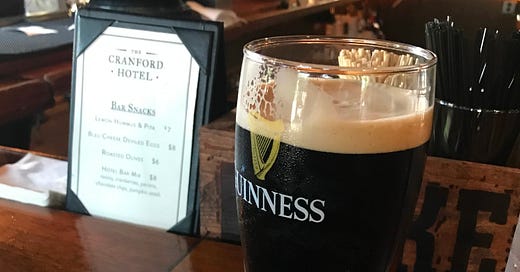Big Stories
Now before we go any further -- to Yale -- I’d just like to lay out for a moment and for future biographers or journalistic or literary historians or just plain fans a little homage to a series of articles that periodically attempted to sum up Tom Wolfe for their readers. You can go back and just marvel at these portraits, most done before the Internet eased our access to everything. It is a fair measure of his celebrity that every few years, usually in connection with the publication of a new book, major magazines would devote thousands of words, and sometimes their covers, to Tom.
I read all of them, saved all of them, these grand syntheses of Tom Wolfe’s life and career. I loved them all. The New York Times Sunday Magazine did this in 1981 and 2004, Vanity Fair in 1987 and 1998. The Paris Review featured Tom in one of its writers-at-work interviews, by now renamed The Art of Fiction, in 1991.
Two stories in particular stand out. Lisa Grunwald, then an editor at Esquire, did a cover story in 1990. At the time I found it querulous and contentious. Ostensibly a celebration of Tom as an American rebel, Grunwald finds him inscrutable and, apparently, infuriating. She questions in particular his fixation on status competition. ``By portraying most people as being driven by vanity, greed, and fear of humiliation, Wolfe rules out the delicious gray areas of life,’’ she writes. He aspires to write realist fiction, but his absolute world-view produces caricatures rather than characters, she says.
Grunwald then goes on to put him on the couch, so to speak. Something happened back there, she ventures. And then: ``Is it so strange to ask whether a man who spends his life writing about status achievement and weenie screaming and status humiliation wasn’t once, say, denied a little status?’’
Wolfe denies it. ``But it’s not true,’’ he says. ``As I look back on it, I was, in grade school, always popular. And I was a good enough athlete to be on varsity teams and to play in amateur leagues and things of that sort. I was president of the student government, what was called the honor council. I certainly never for a second felt like an outsider in any way. I was the coeditor of the school newspaper in high school, and I played on the basketball team and the baseball team. So there are two ways of looking at this,’’ he continues. ``The psychological explanation is that my contrary way of looking at the world is derived from some personal experience that I don’t want anybody to know about. The other explanation is that I’m right.’’
You can parse this answer and see what Tom doesn’t mention: Graduate school.
I remember first reading the Grunwald piece and finding it disputatious and tedious with its extended Tom-Wolfe-as-Ice-Cream-Man metaphor. I also found it more than a bit dense, reading and re-reading it in order to try and figure out what she was talking about.
But Grunwald had a point. Something did happen back there.
Which brings us to the final big, essential article that I’d like to flag for future Wolfe students, and that is Michael Lewis’s 2015 Vanity Fair story, ``How Tom Wolfe Became . . . Tom Wolfe.’’
This is perhaps the ultimate big synthesis, because Lewis had a first cut at the papers the author had just sold to the New York Public Library, and because he apparently had carte blanche from the man himself on quotation, as well as a nice sit-down. It is no coincidence that this is the piece that inspired the Richard Dewey 2023 documentary, ``Radical Wolfe.’’
Tom’s dissertation failed, and he had to rewrite it to earn his doctorate.
Until the Lewis Vanity Fair piece, Wolfeologists told the same story. Born in Richmond, St. Christopher’s, Washington & Lee, Yale, journalism, as though it was the most natural thing in the world to spend five years getting a doctorate and then going into journalism. Happens all the time, right? Everyone seemed to accept it on faith. Well, of course you go to graduate school for five years and then enter journalism. Of course you do.
Now I know that today advanced degrees may seem almost a prerequisite for a job in journalism, but they were extremely rare in the 1950s and 1960s. And yet, no one thought to question this career path of Tom’s. Or, it doesn’t look that way. If anyone did, it doesn’t seem to have had any impact on all the interviewers over all the years, myself included, who sat down with the man. Yet, in fact, Tom’s Yale experience was the bridge between Professor Wolfe and New Journalist Tom Wolfe. Yale was the What Happened Back There posited by Grunwald.



